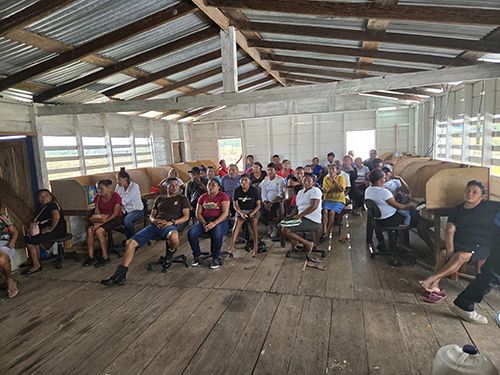In an effort to garner in-depth information regarding issues facing citizens across Guyana, the Alliance for Change (AFC) says that it has embarked on what it describes as a “listening and grounding campaign”.
In a release on Wednesday, the AFC said that these informal listening sessions will take place everywhere – in the markets, corner shops, community grounds, citizens’ bridges, yards, and in the hinterland and riverine communities, “even through deplorable roads, dilapidated bridges, overgrown bushes, floods and impassable mountainous terrain to engage citizens in issues that affect them.”
AFC Leader, Nigel Hughes, it stated, has made it clear that this outreach has no interest on reaching electorates from one particular ethnic group but instead, is cross-sectional. “The AFC is political party, competing nationally in every square inch of this country, in every village, in every city, in every municipality, we don’t approach it on the basis of splitting votes because we do not recognize that people belong ethnically to anybody and we are going to meet everybody as far South as Guns, as far East as the Corriverton and Moleson Creek, as far West as Baramita or Barima to understand what our citizens, are experiencing at every socio-economic level,” Hughes was quoted as saying.
As such, the campaign reach will seek to include the vulnerable, marginalised and those not afforded the equality of opportunity in every sector in the fastest growing economy in the world, which just happens to be their homeland.
According to the release, the AFC will restate in every forum that 48 per cent of Guyanese live in poverty as stated by the World Bank (WB) Report (2022) fact sheet. Added to this, a UNICEF, WHO & World Bank 2023, Levels and Trends in Child Malnutrition Report, “alarmingly” reveals that Guyana leads in Wasting – a child malnutrition condition – topping the chart in Latin America and the Caribbean.
The AFC also seeks to remind that all Guyanese must be cognizant of the fact that the government is only the custodian of oil revenues, however, while the money belong to the citizens, the data reveals a starkly different socio-economic phenomenon which indicates that half of Guyana’s population is in “absolute or transient” poverty.
The release noted that while the WB and UNICEF use the positivist (quantitative) method of data collection in their survey, the AFC will be employing the interpretivist (qualitative) method which relies on information generated by citizens to construct meaning in the aforementioned context.
It pointed out that so far, in the community visits, the team has been interviewing and listening to citizens lived experiences and assisting in articulating concepts clearly, and in this sense meanings are constructed. Information is collected by observing (or participating) with citizens in their own settings, such as in the marketplace, public spaces, and hinterland and riverine communities.
At this level, the release assures that the team is getting a better sense of the unspoken rules, practices and experiences in communities such as – what are the agricultural /economic practices in communities? Is produce locally grown or sourced from another location? Is flood relief equally distributed or have some been marginalised because of political affiliation? Are subsides granted, and if so, has it been done in an equitable manner?
Demarcation
Further, in the hinterland regions, land demarcation is a pressing issue for the First Peoples while questions are being posed regarding issues such as the equitable access to welfare services, health, education, social services, poor salaries and high cost of living, and the imbalance of infrastructural development in rural/poorer communities, all “in the fastest growing economy in the world.”
“The strength of this team’s research is in the qualitative methodology (themes of messages) which reveals the lived experiences of citizens, such as, ‘We are not getting anything from the oil money.’ It relies on information generated from talking with people to construct meaning of the vulnerabilities of citizens which are sensitive and more suited for non-causal explanations and so far, these are: ‘The cost of living is high,’ ‘high cost of electric and water bills,’ ‘salaries and pensions are not sufficient,’ ‘poor drainage and deplorable roads,’ ‘with oil the rich are getting richer and the poor, poorer,’ ‘the oil money is not reaching us,’ ‘where is the oil money going?’
The Listening and Grounding team has assured it will visit every region in Guyana and the qualitative data gathered from interviews will be quantified to measure the frequency of “affected livelihood”. It will then categorise the recurring messages of “severe hardships and difficulties” for citizens, which underscores their perception and experiences in their communities. And when a representative sample population is reached the data analysis will generate inferences that are unbiased, that is the procedure for analysis will be taken as an average across many applications which will not tilt the outcome in extreme directions, the release explained.
The data analysis will be done cross-sectional with reference to academia, reports from international agencies such as the WB, UN agencies, IDB, Transparency International, Human Development Indices, inter alia, in the said context.
As far as the AFC is concerned, the participatory model of governance informs that the lower echelons and their users should be involved in policy formation because they possess a higher level of information on issues which affects them; and as such, their engagement builds legitimacy for implementation of policies/projects.






